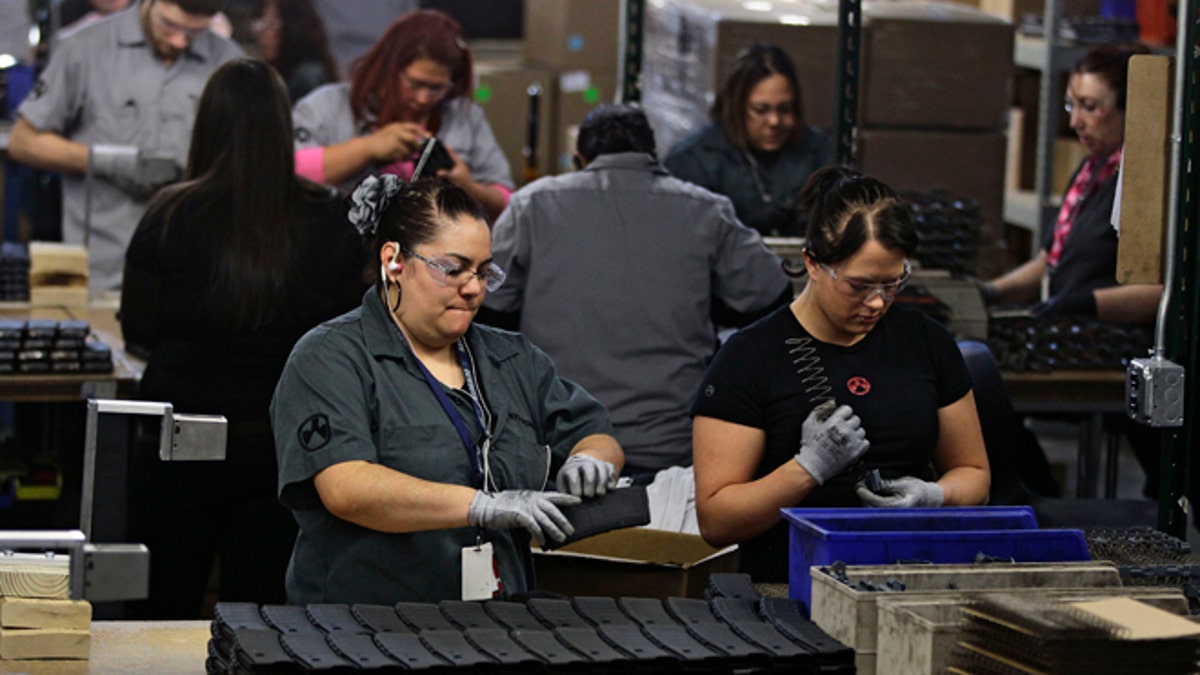
Feb. 28, 2013: In this photo, workers assemble 30-round capacity ammunition magazines for high-velocity rifles, inside the Magpul Industries plant in Erie, Colo. (AP)
ERIE, Colo. – Unnoticed amid dozens of tract homes in the Denver suburbs, a nondescript industrial building is suddenly in the middle of the gun control debate in Colorado.
The company, started in an ex-Marine's basement in 1999, is in a standoff with Colorado Democrats who want to restrict the size of ammunition magazines after mass shootings in a suburban Denver movie theater and a Connecticut elementary school. Magpul has issued lawmakers an ultimatum potentially worth millions: Pass the bill, and the business will move.
It's a bold threat from a company that, by its founder's admission, has distanced itself from politics.
"The people who wrote the bill didn't even know we existed in the state," said Richard Fitzpatrick, the founder and president of the company, one of the country's largest producers of magazines and other firearm accessories for gun enthusiasts, law enforcement and the military.
The warning from Erie-based Magpul underscores the political pressures Democrats are weighing as they advance the strictest gun-control measures lawmakers have ever considered in a state that still prides its frontier spirit. Other gun-control proposals include universal background checks, a ban on concealed firearms on campuses, and holding assault-weapon sellers and owners liable for shootings.
Opponents need only three Democrats in the Senate to vote no against the magazine proposal to defeat it, and two have already said they won't support the bill. But most Democrats are not budging.
"When you have the means available to you at every single corner to commit a horrendous act, we will continue to see what we've seen, which is the status quo, where unfortunately gun violence and violence in general is prevalent in our communities," said Democratic Sen. Jessie Ulibarri, who will be considering the magazine bill on Monday in the Judiciary Committee. The bill has already passed the House, and Democratic Gov. John Hickenlooper has promised to sign it.
The bill would make it a crime to have magazines that can carry more than 15 rounds, with a stricter limit of eight for shotguns. People who own larger magazines now would be allowed to keep them.
As the debate unfolds, states have made overtures to Magpul, including offering to pay their moving costs. The company won't name the states, but Wyoming and Texas have expressed interest in netting the $85 million the company projects it will spend in Colorado next year in payments to suppliers, subcontractors and service providers. Magpul said the move would also impact its 200 employees, plus an additional 400 who work for suppliers and subcontractors.
"It's not so much, `Oh, these people are making something that's going to cost Colorado lives.' We truly believe this bill will do nothing. It's a feel-good measure," Fitzpatrick said. "But these (workers) will be directly affected."
Fitzpatrick said the bill's requirement that all magazines have serial numbers adds enough production costs to make it worth leaving. He also said smaller magazines can be easily connected to each other -- magazines can be hooked up to make a 60-round magazine, for example -- and the company fears it would legally liable if people were to do that.
Democrats have tried to ease Magpul's fears, amending the bill to make clear that the company can still manufacture magazines of any size, as long as they're sold only out-of-state, to the military or law enforcement.
Republicans who oppose the restrictions argue Democrats are sending mixed messages about gun control to keep a company in Colorado.
"It's being hypocritical. These things are either bad or they're not," said Republican Rep. Brian DelGrosso.
Magpul argues that limiting magazine sizes will not reduce gun violence, and that criminals will find ways around laws, including going to other states to buy larger magazines. Magpul officials note that some of their products sometimes end up in California, which limits magazine sizes to 10 rounds.
"The solutions that people want to bring up are hardware solutions," said Magpul Director Duane Liptak. "And they want to talk about this physical piece of equipment that's not inherently evil. It's not inherently good. It's a tool like anything else. It can be used for good, and it can be used improperly by people who have evil in their hearts."
Supporters of the proposals say Magpul is bluffing and that a move would prove too costly.
"I don't think Magpul is about to pull out," said Bill Hoover, 83, whose grandson AJ Boik was among the 12 killed in the theater shooting. "It's going to cost them a bundle of money."
Fitzpatrick said his company is serious.
"It's not really a threat. It's a promise," he said.
Sens. Lois Tochtrop and Cheri Jahn are the two Democrats voting against the bill. Both say they don't believe it addresses the main problem -- mental health -- and Tochtrop also cited Magpul's potential departure.
"I think we really need to address that problem. Look at the cause, not the tool," Tochtrop said.




